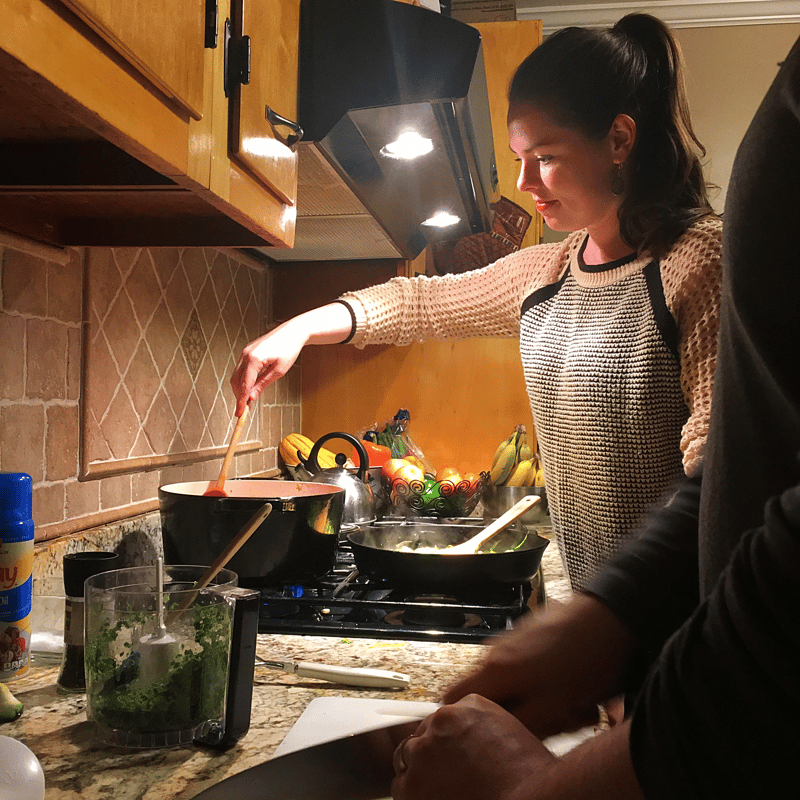
Diverticulosis is no walk in the park.
Symptoms of a flare up can cause debilitating pain that disrupts the flow of your daily life and sometimes even lands you in the hospital for intervention.
There has to be a better way.
Good news! Many people have found success with OnPoint's diverticulitis treatment plan, which is grounded in the latest medical findings and has been used to improve the health and well-being of hundreds of individuals.
More than 3,000 people have turned to OnPoint Nutrition for assistance in managing chronic conditions and reclaiming control of their lives. OnPoint's approach to diverticulitis treatment and management is science-based and personally tailored to each client.
We develop a strategy for your health journey after thinking about your diagnosis, nutrition, routine, and way of life.
Here's everything you need to know about symptoms to look for, how a dietitian can help, and what working with a registered dietitian through OnPoint Nutrition looks like to control your diverticulitis.
What is Diverticulitis?
Diverticulitis is characterized by the inflammation (and sometimes infection) of diverticula (fluid-filled pouches in the lower large intestine/colon). The presence of these pouches in any state (inflamed or not) is called diverticulosis.
The presence of diverticula is common, and the condition of diverticulosis will not necessarily disrupt your well-being.
You may find that small dietary changes, antibiotics, and rest easily treat diverticulitis.
However, those who suffer frequent, long-term bouts with this condition may find themselves facing a surgical intervention.
Some warning signs and symptoms of diverticulitis:
Some of the symptoms of diverticulitis include:
- Pain, which may be constant and persist for several days (usually the lower left side of the abdomen, although, sometimes the right side may be more painful)
- Nausea and vomiting
- Fever
- Abdominal tenderness
- Constipation or, less commonly, diarrhea
If these symptoms are experienced, particularly for several days, it is best to visit your physician as soon as possible. In most cases, a doctor will conduct an examination to look for telltale signs of diverticulitis.
Frequently this will be done via colonoscopy - ahhh! We know, we know!.
It's essential to address these issues when they arise – scary camera devices or not – so that you can get the treatment that you need instead of playing a guessing game.
How Can An Online Dietitian Help With Diverticulitis?
Once you are aware of your diagnosis, it's crucial to maintain a mindful diet where you properly nourish your body while avoiding foods that irritate your diverticula and cause inflammation and infection.
Creating this balance is difficult for those who need to be trained in nutrition and information related to this chronic illness.
A knowledgeable nutrition coach, like a registered dietitian, will take into account all of your unique circumstances as they relate to your diverticulitis to help you lead a happier, healthier life.
When faced with a diverticulitis diagnosis, you have to decide whether you are ready to commit to learning more about nutrition.
Then you can create a lifestyle to avoid flare-ups or if you will see what comes your way and likely suffer for it. If you have made it this far, you are likely ready to take control of your health and make lifestyle choices that promote your best self.
You don't have to let your diagnosis rule your life.
At OnPoint Nutrition, our team takes a systematic approach to holistic nutrition counseling.
We believe that diet and lifestyle significantly impact health and wellness. To get you started on the road to better health, our team of qualified professionals is here and ready to assist you.
Let’s take a look at our 3 step OnPoint approach to managing a chronic condition like Diverticulosis.
Step 1: Assessment
As previously noted, the diverticular disease has two phases:
- the active phase (diverticulitis)
- the dormant phase (diverticulosis)
Whether you are currently experiencing the active or dormant phase, research suggests dietary changes are the key to preventing and treating symptoms.
To determine the best treatment approach, we must first decide which phase your condition is in and assess what dietary changes need to be made to keep your phase dormant.
Diverticulosis and Diverticulitis Diet Basics
Diverticulosis Diet
You know what they say – the best treatment is prevention! The Diverticulosis diet is aimed at preventing a Diverticulitis flare.
Kaitlyn Willwerth, MS, RD, CLT, says:
"Although the direct cause of diverticulitis is unknown, it is thought that constipation and increased pressure within the colon have a direct impact.
Therefore, a high-fiber diet is the key to prevention.
Some foods rich in fiber include:
- Fruits: Raspberries, pears, apples, bananas, oranges, strawberries
- Vegetables: Peas, broccoli, dark leafy greens, brussels sprouts, potatoes, corn, cauliflower, carrots
- Whole Grains: Whole wheat pasta, barley, quinoa, brown rice, oatmeal, popcorn, whole grain bread
- Beans & Legumes: Split peas, lentils, black beans, kidney beans, chickpeas
Consuming these foods as part of a balanced diet will help you remain regular and avoid constipation, which will help prevent flares.
Diverticulitis Diet
If you find yourself in a diverticulitis flare, your doctor may recommend temporary dietary restrictions to allow the colon to rest and clear the infection.
Kaitlyn Willwerth, MS, RD, CLT, says:
"The most common recommendation is a liquid diet. The liquid diet includes all liquids and liquid-like food products and should only be followed for 2-3 days or until symptoms improve.
- Liquids: Water, electrolyte drinks, juice, broth, tea, coffee
- Liquid-like foods: Jell-O, hard candy, popsicles, ice chips
Following the liquid diet, you may be instructed to begin adding bland, low-fat foods and liberalizing as symptoms improve.
Step 2: Program Personalization
After determining the best treatment plan for you, our dietitians will create personalized materials to help get you started and guide you on your health journey.
Regarding diverticulosis, our team focuses on a few different diet and lifestyle improvements to help manage your condition long-term and prevent future diverticulitis flares.
Some of these diverticulosis management techniques are:
- High Fiber Diet: Your nutritionist or dietitian will calculate your energy and macronutrient needs to determine your optimal food intake. The quality of your food will be a significant topic of conversation to ensure that the calories and macronutrients that you are eating are high in fiber to support healthy bowel function.
- Regular Exercise: Exercise promotes regular bowel movements and can help to reduce pressure inside your colon. We will work with you to determine the right exercise plan for your lifestyle and abilities.
- Hydration: Fiber's function is to absorb water and increase bulk in your stool to allow it to pass through the colon more efficiently. However, replacing the fluid utilized in the colon is vital to ensure proper hydration is maintained. We will help you determine how much water you should drink daily to support healthy bowel function.
Step 3: Monitor outcomes
Research suggests sustainable dietary changes are the best way to achieve long-term results.
If you can create new habits and intuitive food choices, you will likely have success in managing your diverticular disease and maintaining these habits for the long run.
By giving you weekly goals and meal plans throughout your program, we can assist you in controlling your diverticular disease and improving your nutrition.
Your online dietitian will keep an eye out for any changes in your condition over time and any triggers and opportunities to improve your health.
These indicators will help us as we design your plan.
From there, we apply our expertise to customize your program to allow you to live a better life and achieve excellent health.
Taking the Next Steps
Diverticulitis in the moment may seem like something that cannot be conquered. But diverticular disease can be managed with determination and perseverance.
You now know that to manage your chronic Diverticulitis it is necessary to evaluate, personalize and evaluate your current lifestyle and the program you implement to see what is working best.
Our team of experts has helped more than 5,000 clients on their health journey. We constantly monitor recent studies and modify our strategy in response to changes that have been confirmed in medical research.
We are conscious that maintaining consistency and sustainability is essential to achieving long-term success. Your dietitian will keep an eye on your development throughout your program to make sure it is helping you.
We will look for changes in symptoms and opportunities to further customize your experience to fit your lifestyle.
These outcome measures help us determine the best plan to provide you with long-term symptom relief, complication prevention, and increased quality of life!
Getting in touch with a trained expert, such as OnPoint Nutrition's team of registered dietitians available online, can help you live a healthier and more fulfilling life.
Let's empower you to take the road to the better health that you deserve.
Topics

With a knack for turning complex nutrition facts into engaging, relatable content, she’s on a mission to make healthy living fun and accessible. Backed by a stellar team of Dietitians and Nutritionists, Abby breathes life into OnPoint’s mission, inspiring others to embrace the transformative power of good nutrition. Her infectious enthusiasm and innovative approach make her a driving force in the journey towards better health for all.





